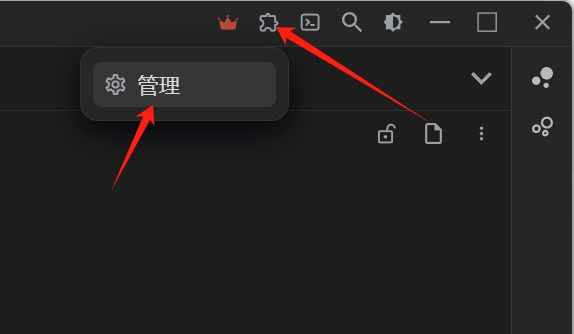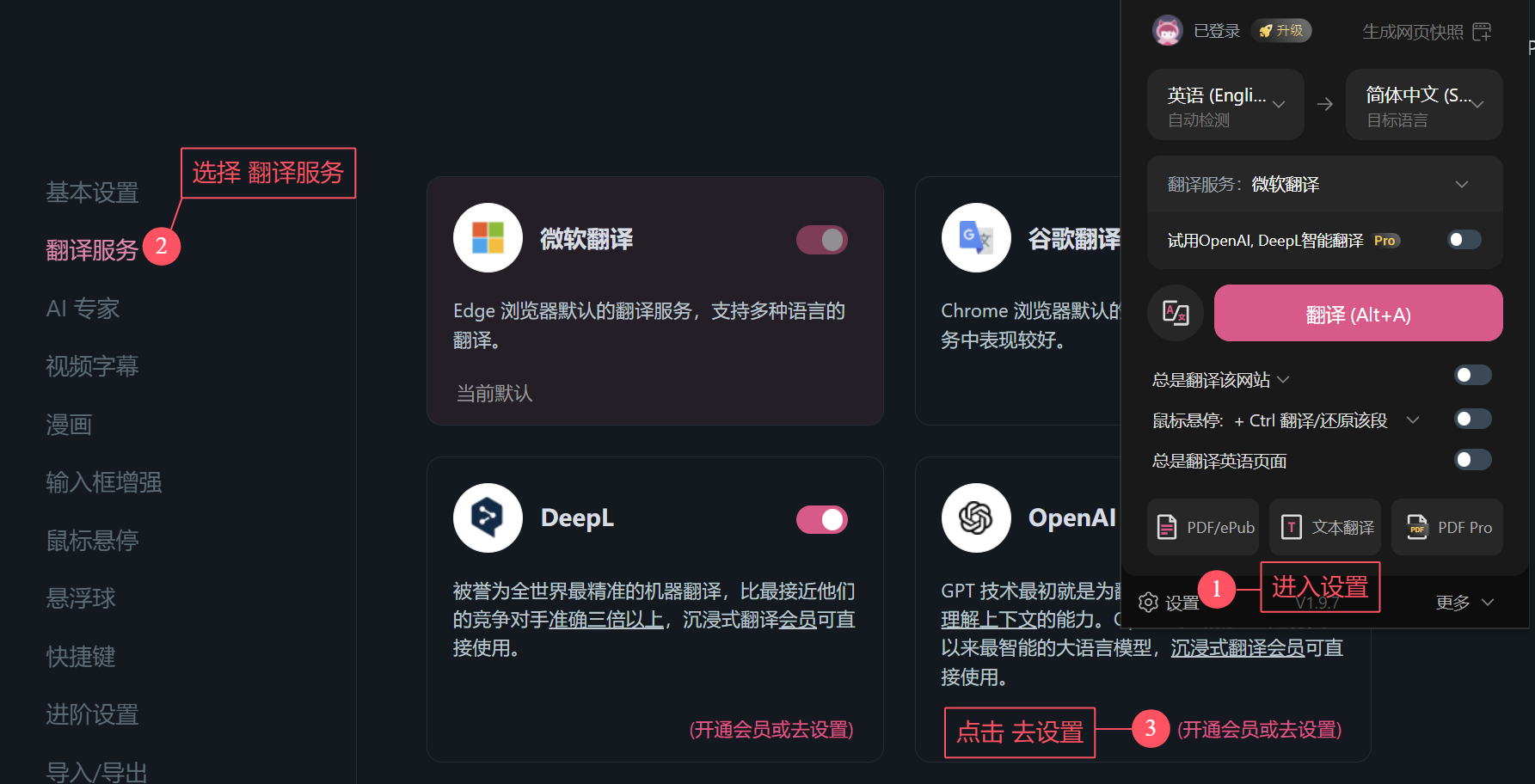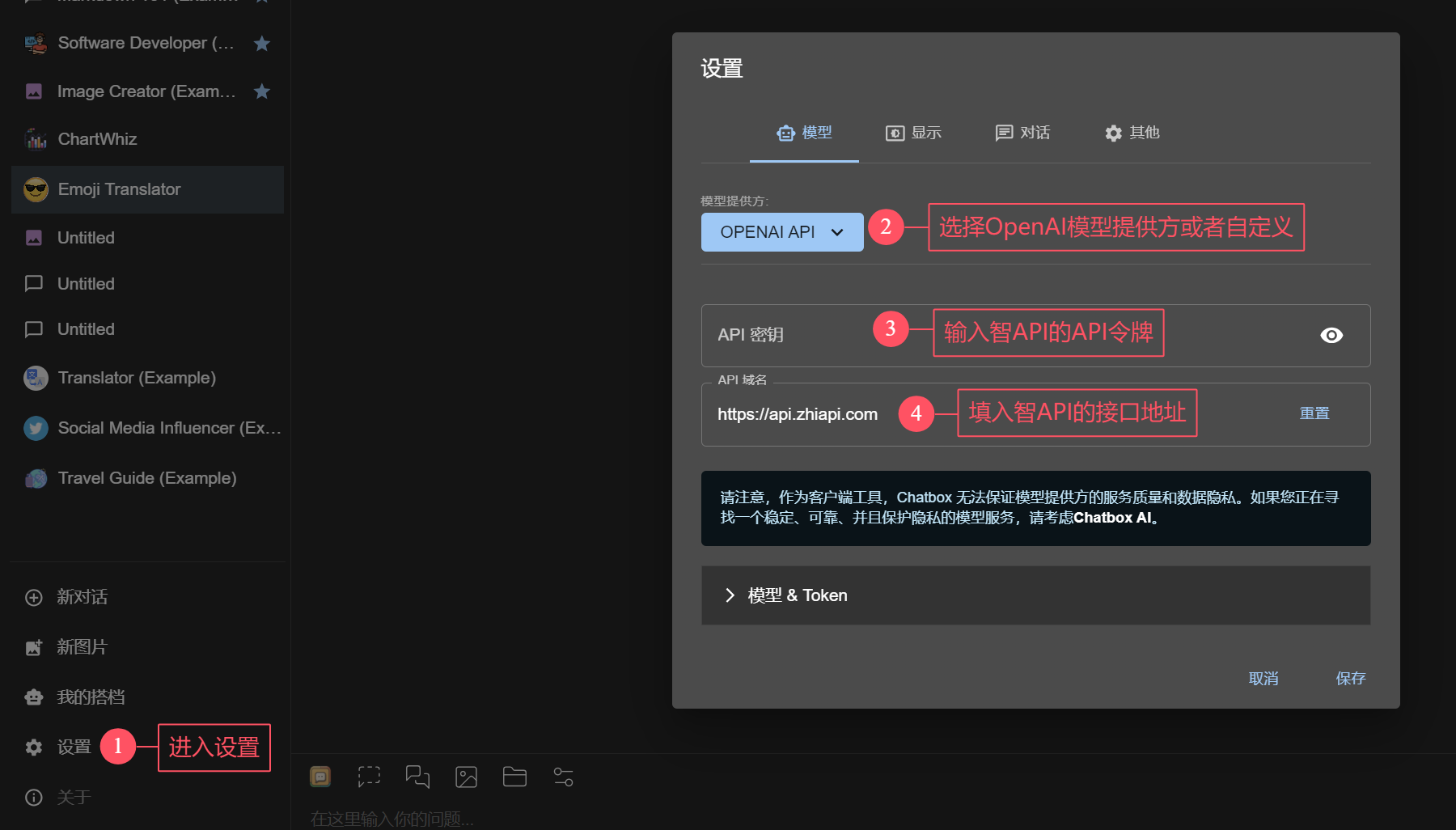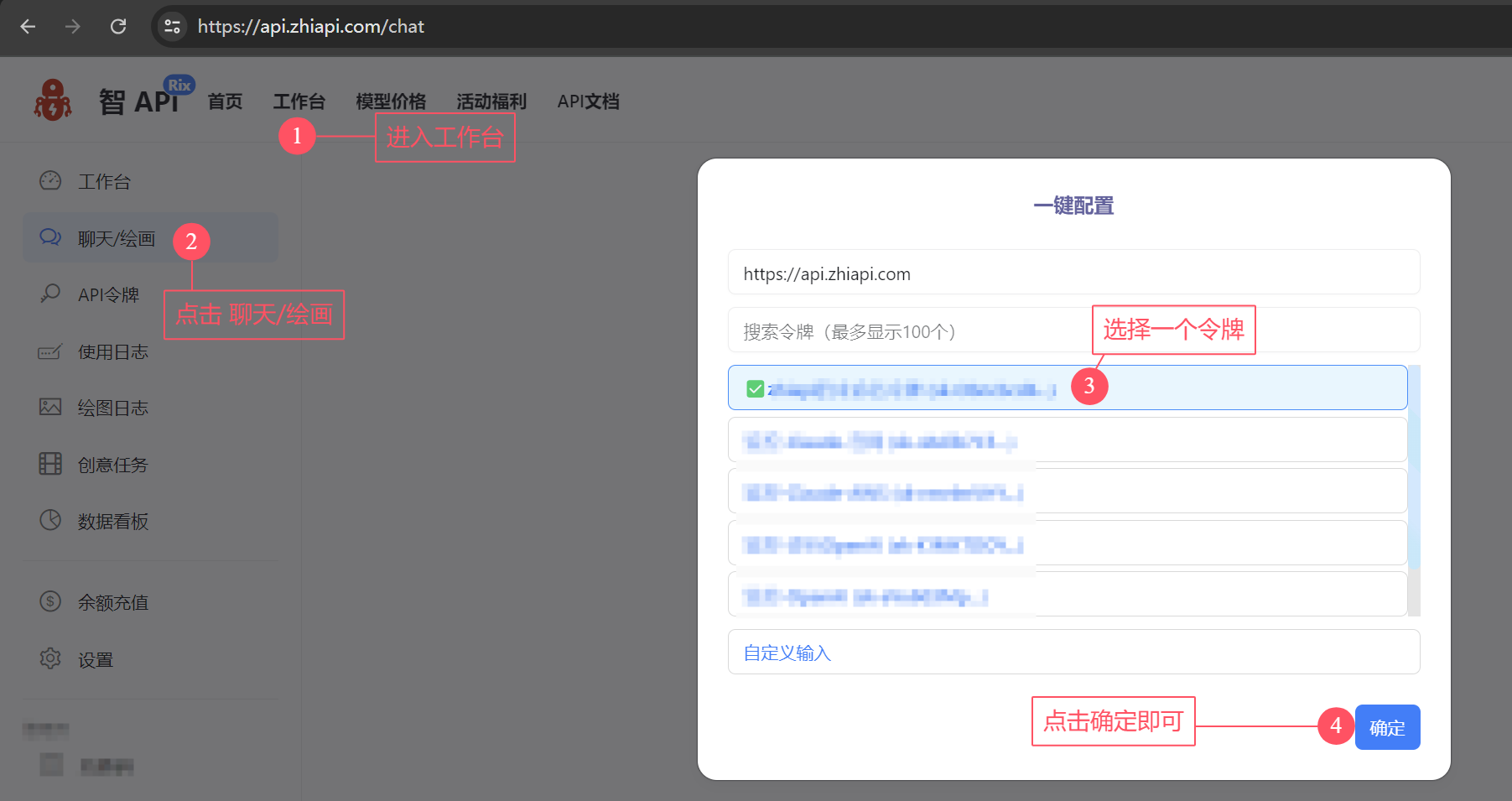在当今快速发展的技术世界中,应用程序接口(API)成为连接不同软件系统的重要工具。智API,以其智能化和高效能,正在改变开发人员与数据互动的方式。无论是初创公司还是大型企业,能够有效地调用和集成API,是在数字化时代中获得竞争优势的关键之一。然而,对于许多开发者而言,如何构建正确的API请求仍然是一项挑战。本文将通过提供一系列易于理解的代码示例,帮助开发者详细了解智API的使用方法及其在实际应用中的操作步骤。探索这些示例将使您能够轻松地掌握智API的精髓,推动您的项目开发进入新的高度。
流式与非流的修改
非流修改:
"stream": false,
流式修改:
"stream": true,
Curl请求代码示例
curl https://api.zhiapi.com/v1/chat/completions \
-H "Content-Type: application/json" \
-H "Authorization: Bearer sk-xxx" \
-d '{
"model": "gpt-3.5-turbo",
"stream": false,
"messages": [
{"role": "system", "content": "You are a helpful assistant."},
{"role": "user", "content": "say 1"}
]
}'Python (SDK)请求代码示例
from openai import OpenAI
client = OpenAI(api_key="sk-xxx", base_url="https://api.zhiapi.com/v1")
completion = client.chat.completions.create(
model="gpt-3.5-turbo",
stream=False,
messages=[
{"role": "system", "content": "You are a helpful assistant."},
{"role": "user", "content": "say 1"}
]
)
print(completion.choices[0].message)Python (requests)请求代码示例
import requests
import json
url = "https://api.zhiapi.com/v1/chat/completions"
headers = {
"Content-Type": "application/json",
"Authorization": f"Bearer sk-xxx"
}
data = {
"model": "gpt-3.5-turbo",
"stream": False,
"messages": [
{"role": "system", "content": "You are a helpful assistant."},
{"role": "user", "content": "say 1"}
]
}
response = requests.post(url, headers=headers, json=data)
if response.status_code == 200:
if False:
for line in response.iter_lines():
if line:
chunk = json.loads(line.decode('utf-8'))
if chunk['choices'][0].get('delta', {}).get('content'):
print(chunk['choices'][0]['delta']['content'], end='')
else:
print(response.json()['choices'][0]['message']['content'])
else:
print(f"Error: {response.status_code}, {response.text}")Node.js请求代码示例
import OpenAI from "openai";
const openai = new OpenAI({
apiKey: "sk-xxx",
baseURL: "https://api.zhiapi.com/v1"
});
async function main() {
const completion = await openai.chat.completions.create({
model: "gpt-3.5-turbo",
stream: false,
messages: [
{ role: "system", content: "You are a helpful assistant." },
{ role: "user", content: "say 1" }
]
});
console.log(completion.choices[0].message);
}
main();Java请求代码示例
import com.theokanning.openai.OpenAiService;
import com.theokanning.openai.completion.chat.ChatCompletionRequest;
import com.theokanning.openai.completion.chat.ChatMessage;
import com.theokanning.openai.service.OpenAiService;
import java.util.Arrays;
public class OpenAIExample {
public static void main(String[] args) {
String token = "sk-xxx";
OpenAiService service = new OpenAiService(token);
ChatCompletionRequest completionRequest = ChatCompletionRequest.builder()
.model("gpt-3.5-turbo")
.messages(Arrays.asList(
new ChatMessage("system", "You are a helpful assistant."),
new ChatMessage("user", "say 1")
))
.build();
service.createChatCompletion(completionRequest).getChoices().forEach(choice -> {
System.out.println(choice.getMessage().getContent());
});
}
}C#请求代码示例
using OpenAI_API;
using OpenAI_API.Chat;
class Program
{
static async Task Main(string[] args)
{
var api = new OpenAIAPI("sk-xxx");
api.ApiBase = "https://api.zhiapi.com/v1";
var chat = api.Chat.CreateConversation();
chat.AppendSystemMessage("You are a helpful assistant.");
chat.AppendUserInput("say 1");
string response = await chat.GetResponseFromChatbotAsync();
Console.WriteLine(response);
}
}Ruby请求代码示例
require 'openai'
client = OpenAI::Client.new(access_token: 'sk-xxx', uri_base: 'https://api.zhiapi.com/v1')
response = client.chat(
parameters: {
model: "gpt-3.5-turbo",
messages: [
{ role: "system", content: "You are a helpful assistant." },
{ role: "user", content: "say 1" }
],
stream: false
}
)
puts response.dig("choices", 0, "message", "content")Go请求代码示例
package main
import (
"context"
"fmt"
"github.com/sashabaranov/go-openai"
)
func main() {
client := openai.NewClient("sk-xxx")
client.BaseURL = "https://api.zhiapi.com/v1"
resp, err := client.CreateChatCompletion(
context.Background(),
openai.ChatCompletionRequest{
Model: "gpt-3.5-turbo",
Messages: []openai.ChatCompletionMessage{
{
Role: openai.ChatMessageRoleSystem,
Content: "You are a helpful assistant.",
},
{
Role: openai.ChatMessageRoleUser,
Content: "say 1",
},
},
},
)
if err != nil {
fmt.Printf("ChatCompletion error: %v
", err)
return
}
fmt.Println(resp.Choices[0].Message.Content)
}PHP请求代码示例
<?php
require_once 'vendor/autoload.php';
$client = OpenAI::client('sk-xxx');
$result = $client->chat()->create([
'model' => 'gpt-3.5-turbo',
'messages' => [
['role' => 'system', 'content' => 'You are a helpful assistant.'],
['role' => 'user', 'content' => 'say 1'],
],
]);
echo $result->choices[0]->message->content;Rust请求代码示例
use reqwest::Client;
use serde_json::{json, Value};
#[tokio::main]
async fn main() -> Result<(), Box<dyn std::error::Error>> {
let client = Client::new();
let response = client.post("https://api.zhiapi.com/v1/chat/completions")
.header("Authorization", "Bearer sk-xxx")
.json(&json!({
"model": "gpt-3.5-turbo",
"messages": [
{"role": "system", "content": "You are a helpful assistant."},
{"role": "user", "content": "say 1"}
]
}))
.send()
.await?;
let body: Value = response.json().await?;
println!("{}", body["choices"][0]["message"]["content"]);
Ok(())
}C请求代码示例
#include <stdio.h>
#include <curl/curl.h>
#include <string.h>
size_t write_callback(char *ptr, size_t size, size_t nmemb, void *userdata) {
printf("%.*s", (int)(size * nmemb), ptr);
return size * nmemb;
}
int main(void) {
CURL *curl;
CURLcode res;
struct curl_slist *headers = NULL;
char *data = "{"
""model": "gpt-3.5-turbo","
""messages": ["
"{"role": "system", "content": "You are a helpful assistant."},"
"{"role": "user", "content": "say 1"}"
"]"
"}";
curl = curl_easy_init();
if(curl) {
headers = curl_slist_append(headers, "Content-Type: application/json");
headers = curl_slist_append(headers, "Authorization: Bearer sk-xxx");
curl_easy_setopt(curl, CURLOPT_URL, "https://api.zhiapi.com/v1/chat/completions");
curl_easy_setopt(curl, CURLOPT_POSTFIELDS, data);
curl_easy_setopt(curl, CURLOPT_HTTPHEADER, headers);
curl_easy_setopt(curl, CURLOPT_WRITEFUNCTION, write_callback);
res = curl_easy_perform(curl);
if(res != CURLE_OK)
fprintf(stderr, "curl_easy_perform() failed: %s\n", curl_easy_strerror(res));
curl_easy_cleanup(curl);
curl_slist_free_all(headers);
}
return 0;
}C++请求代码示例
#include <iostream>
#include <curl/curl.h>
#include <string>
size_t WriteCallback(void *contents, size_t size, size_t nmemb, std::string *s) {
size_t newLength = size * nmemb;
s->append((char*)contents, newLength);
return newLength;
}
int main() {
CURL *curl;
CURLcode res;
std::string readBuffer;
curl = curl_easy_init();
if(curl) {
std::string url = "https://api.zhiapi.com/v1/chat/completions";
std::string data = R"({
"model": "gpt-3.5-turbo",
"messages": [
{"role": "system", "content": "You are a helpful assistant."},
{"role": "user", "content": "say 1"}
]
})";
struct curl_slist *headers = NULL;
headers = curl_slist_append(headers, "Content-Type: application/json");
headers = curl_slist_append(headers, "Authorization: Bearer sk-xxx");
curl_easy_setopt(curl, CURLOPT_URL, url.c_str());
curl_easy_setopt(curl, CURLOPT_POSTFIELDS, data.c_str());
curl_easy_setopt(curl, CURLOPT_HTTPHEADER, headers);
curl_easy_setopt(curl, CURLOPT_WRITEFUNCTION, WriteCallback);
curl_easy_setopt(curl, CURLOPT_WRITEDATA, &readBuffer);
res = curl_easy_perform(curl);
curl_easy_cleanup(curl);
if(res != CURLE_OK)
std::cerr << "curl_easy_perform() failed: " << curl_easy_strerror(res) << std::endl;
else
std::cout << readBuffer << std::endl;
}
return 0;
}Dart请求代码示例
import 'package:http/http.dart' as http;
import 'dart:convert';
void main() async {
final url = Uri.parse('https://api.zhiapi.com/v1/chat/completions');
final response = await http.post(
url,
headers: {
'Content-Type': 'application/json',
'Authorization': 'Bearer sk-xxx',
},
body: jsonEncode({
'model': 'gpt-3.5-turbo',
'messages': [
{'role': 'system', 'content': 'You are a helpful assistant.'},
{'role': 'user', 'content': 'say 1'},
],
}),
);
if (response.statusCode == 200) {
final jsonResponse = jsonDecode(response.body);
print(jsonResponse['choices'][0]['message']['content']);
} else {
print('Request failed with status: ${response.statusCode}.');
}
}更多Python调用OpenAI API的教程可以去官网查看:https://platform.openai.com/docs/quickstart
© 版权声明
文章版权归作者所有,未经允许请勿转载。



